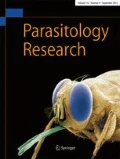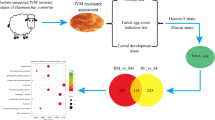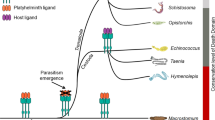Abstract
Opisthorchis felineus is a trematode flatworm that parasitises mammals, including humans, and is mainly spread throughout Eastern Europe and Western Siberia. The main drug used in treatment of opisthorchiasis and other trematode and cestode infestations is praziquantel (PZQ). We provide a possible explanation of PZQ-mediated tegument disruption. The idea is that the nature of tegument disruption is related to failure of surface renovation due to insufficiency of microtubule transport of vesicles. This insufficiency arises from microtubule destabilisation, which in the medium term leads to the decrease in tubulins alpha, beta and dynein mRNA amounts and deficiency of the corresponding proteins. We also found the upregulation of cGMP-dependent protein kinase gene, and we concluded that its protein product helped to overcome the effect of praziquantel and might be a promising target for combined anthelmintic therapy with PZQ. We concluded that function of saposin-like protein 2 (SAP2) is unlikely associated with membrane fusion, and SAP2 is probably able to bind some type of hydrophobic compounds including praziquantel.





Similar content being viewed by others
References
Becker B, Mehlhorn H, Andrews P, Thomas H (1981) Ultrastructural investigations on the effect of Praziquantel on the tegument of five species of cestodes. Z Parasitenkd 64:257–269. https://doi.org/10.1007/BF00927373
Chai J (2013) Praziquantel treatment in trematode and cestode infections : an update. Infect Chemother 45:32–43. https://doi.org/10.3947/ic.2013.45.1.32
Chan JD, Zarowieski M, Marchant JS (2014) Ca2+ channels and praziquantel: a view from the free world. Parasitol Int 62:619–628. https://doi.org/10.1016/j.parint.2012.12.001.Ca
Fedorova OS, Kovshirina YV, Kovshirina AE, Fedotova MM, Deev IA, Petrovskiy FI, Filimonov AV, Dmitrieva AI, Kudyakov LA, Saltykova IV, Odermatt P, Ogorodova LM (2017) Opisthorchis felineus infection and cholangiocarcinoma in the Russian Federation: a review of medical statistics. Parasitol Int 66:365–371. https://doi.org/10.1016/j.parint.2016.07.010
Gasic I, Boswell SA, Mitchison TJ (2019) Tubulin mRNA stability is sensitive to change in microtubule dynamics caused by multiple physiological and toxic cues. PLoS Biol 17:e3000225. https://doi.org/10.1371/journal.pbio.3000225
Giri BR, Roy B (2016) Praziquantel induced oxidative stress and apoptosis-like cell death in Raillietina echinobothrida. Acta Trop 159:50–57. https://doi.org/10.1016/j.actatropica.2016.03.022
Huta BP, Mehlenbacher MR, Nie Y, Lai X, Zubieta C, Bou-Abdallah F, Doyle RP (2016) The lysosomal protein saposin B binds chloroquine. Chem Med Chem 11:277–282. https://doi.org/10.1002/cmdc.201500494.The
Jin G, Kubo H, Kashiba M, Horinouchi R, Hasegawa M, Suzuki M, Sagawa T, Oizumi M, Fujisawa A, Tsukamoto H, Yoshimura S, Yamamoto Y (2008) Saposin B is a human coenzyme Q10-binding / transfer protein. J Clin Biochem Nutr 42:167–174. https://doi.org/10.3164/jcbn.2008024
Jiraungkoorskul W, Sahaphong S, Sobhon P (2005) Effects of praziquantel and artesunate on the tegument of adult Schistosoma mekongi harboured in mice. Parasitol Int 54:177–183. https://doi.org/10.1016/j.parint.2005.04.001
Kumar S, Stecher G, Tamura K (2016) MEGA7: molecular evolutionary genetics analysis version 7.0 for bigger datasets. Mol Biol Evol 33:1870–1874. https://doi.org/10.1093/molbev/msw054
Leutner S, Beckmann S, Grevelding CG (2011) Characterization of the cGMP-dependent protein kinase SmcGK1 of Schistosoma mansoni. Ann Braz Acad Sci 83:637–648. https://doi.org/10.1590/s0001-37652011000200023
Lima SF, Vieira LQ, Harder A, Kuselj JR (1994) Effects of culture and praziquantel on membrane fluidity parameters of adult Schistosoma mansoni. Parasitology 109:57–64. https://doi.org/10.1017/s0031182000077763
Lovis L, Mak TK, Phongluxa K et al (2012) Efficacy of praziquantel against Schistosoma mekongi and Opisthorchis viverrini : a randomized, single-blinded dose-comparision trial. PLoS Negl Trop Dis 6. https://doi.org/10.1371/journal.pntd.0001726
Martin-Romero FJ, Lopez-guerrero AM, Pascual-caro C (2017) The interplay between cytoskeleton and calcium dynamics., Cytoskeleton structure, Dynamics, Function and Disease, pp 73–88. https://doi.org/10.5772/66862
Mehennaoui K, Legay S, Serchi T, Guérold F, Giamberini L, Gutleb AC, Cambier S (2018) Identification of reference genes for RT-qPCR data normalization in Gammarus fossarum ( Crustacea Amphipoda ). Nat Sci Rep 8:1–8. https://doi.org/10.1038/s41598-018-33561-1
Meister I, Kovac J, Duthaler U et al (2016) Pharmacokinetic study of praziquantel enantiomers and its main metabolite R- trans −4-OH-PZQ in plasma , blood and dried blood spots in Opisthorchis viverrini -infected patients. PLoS Negl Trop Dis:1–15. https://doi.org/10.1371/journal.pntd.0004700
Mordvinov VA, Ershov NI, Pirozhkova DS, Pakharukov YV, Pakharukova MY (2017) ABC transporters in the liver fluke Opisthorchis felineus. Mol Biochem Parasitol 216:60–68. https://doi.org/10.1016/j.molbiopara.2017.07.001
Park S, Gunaratne GS, Chulkov EG et al (2019) The anthelmintic drug praziquantel activates a schistosome. J Biol Chem 294:18873–18880. https://doi.org/10.1074/jbc.AC119.011093
Pirozhkova D, Katokhin A (2020) Infection , genetics and evolution saposin-like proteins in Opisthorchis felineus and related opisthorchids. Infect Genet Evol 78:104132. https://doi.org/10.1016/j.meegid.2019.104132
Pomaznoy MY, Logacheva MD, Young ND, Penin AA, Ershov NI, Katokhin AV, Mordvinov VA (2016) Whole transcriptome profiling of adult and infective stages of the trematode Opisthorchis felineus. Parasitol Int 65:12–19. https://doi.org/10.1016/j.parint.2015.09.002
Qi X, Chu Z (2004) Fusogenic domain and lysines in saposin C. 424:210–218. https://doi.org/10.1016/j.abb.2004.02.023
Quinn KE, Castellani L, Ondrias K, Ehrlich BE (1998) Characterization of the ryanodine receptor / channel of invertebrate muscle. Am J Phys 272:494–502. https://doi.org/10.1152/ajpregu.1998.274.2.R494
Roberts AJ, Kon T, Knight PJ, Sutoh K, Burgess SA (2013) Functions and mechanics of dynein motor proteins. Nat Rev Mol Cell Biol 14:713–726. https://doi.org/10.1038/nrm3667
Sereerak P, Upontain S, Tangkawattana P, Mallory FF, Sripa B, Tangkawattana S (2017) Treatment of feline reservoir hosts with opisthorchiasis. Parasitol Int 66:448–452. https://doi.org/10.1016/j.parint.2016.08.005
Shuhua X, Binggui S, Chollet J, Tanner M (2000) Tegumental changes in adult Schistosoma mansoni harboured in mice treated with praziquantel enantiomers. Acta Trop 76:107–117. https://doi.org/10.1016/s0001-706x(00)00076-0
Sripa B, Brindley PJ, Mulvenna J, Laha T, Smout MJ, Mairiang E, Bethony JM, Loukas A (2012) The tumorigenic liver fluke Opisthorchis viverrini –multiple pathways to cancer Banchob. Trends Parasitol 28:395–407. https://doi.org/10.1016/j.pt.2012.07.006.The
Thivierge K, Cotton S, Schaefer DA, Riggs MW, To J, Lund ME, Robinson MW, Dalton JP, Donnelly SM (2013) Cathelicidin-like Helminth defence molecules ( HDMs ): absence of cytotoxic, anti-microbial and anti-protozoan activities imply a specific adaptation to immune modulation. PLoS Negl Trop Dis 7:e2307. https://doi.org/10.1371/journal.pntd.0002307
Toya M, Takeichi M (2016) Organization of non-centrosomal microtubules in epithelial cells. Cell Struct Funct 135:127–135. https://doi.org/10.1247/csf.16015
Vangheluwe P, Sipido KR, Raeymaekers L, Wuytack F (2006) New perspectives on the role of SERCA2 ’ s Ca 2 + affinity in cardiac function. Biochim Biophys Acta 1763:1216–1228. https://doi.org/10.1016/j.bbamcr.2006.08.025
Wang Y, Hekimi S (2016) Understanding ubiquinone. Trends Cell Biol 26:367–378. https://doi.org/10.1016/j.tcb.2015.12.007
WHO | Opisthorchiasis felinea (2014). https://www.who.int/foodborne_trematode_infections/opisthorchiasis/Opisthorchiasis_felinea/en/. Accessed 15 May 2020
Wiest PM, Li Y, Olds GR, Bowen WD (1992) Inhibition of phosphoinositide turnover by praziquantel in Schistosoma mansoni. J Parasitol 78:753–755
You H, Mcmanus DP, Hu W et al (2013) Transcriptional responses of in vivo praziquantel exposure in schistosomes identifies a functional role for calcium signalling pathway member CamKII. PLoS Pathog 9:9. https://doi.org/10.1371/journal.ppat.1003254
Funding
This work was supported by RF Budget project number 0324-2019-0041-C-01.
Author information
Authors and Affiliations
Corresponding author
Ethics declarations
Conflict of interest
The authors declare that there is no conflict of interest.
Additional information
Section Editor: Xing-Quan ZHU
Publisher’s note
Springer Nature remains neutral with regard to jurisdictional claims in published maps and institutional affiliations.
Electronic supplementary material
ESM 1
(DOCX 50 kb)
Rights and permissions
About this article
Cite this article
Pirozhkova, D., Katokhin, A. Opisthorchis felineus genes differentially expressed under praziquantel shed light on the nature of tegument disruption and indicate the adaptive role of cGMP-dependent protein kinase. Parasitol Res 119, 2695–2702 (2020). https://doi.org/10.1007/s00436-020-06764-7
Received:
Accepted:
Published:
Issue Date:
DOI: https://doi.org/10.1007/s00436-020-06764-7




